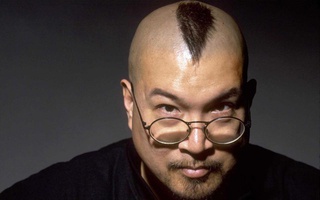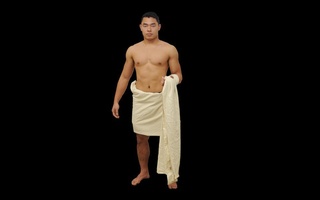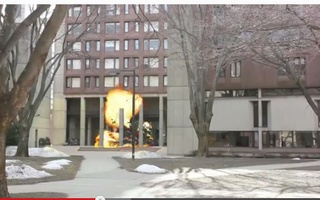In my sophomore year, two blockmates transformed the sports culture at Harvard. Now, one is doing the same in the NBA, and the other is making sure no one forgets about it. While much attention has deservedly been paid to hoops sensation Jeremy Lin ’10 and the role he played in changing the culture of Crimson basketball, no one in school at the time could forget the role that his blockmate Cheng Ho ’10 played.
In many ways, Lin and Ho seem to be the perfect complements to each other. Lin was quiet and humble in interviews. He’d never project his own performances, so, to an extent, Ho had to. Even now after his jaw-dropping performances, Lin is quick to credit his teammates, including the one he has up in the sky. It’s extremely impressive.
But just as impressive is Ho’s ability to stay “team first,” to continue to be Lin’s loudest and most influential fan, and to sublimate his own ego in order to raise up the stature of a friend.
Ho’s acts are especially noble when you consider that he used to be the one making the headlines. Because before he began the push to get Lin invited to the rookie-sophomore game, before he became the leader of the student section at Lavietes Pavilion, and before Lin even became a starter, Ho was an All-Ivy running back and a star athlete with his own underdog story.
After emigrating from Taiwan when his father died and his mother became ill, Ho arrived in Martinez, Ga. unable to speak any English. But by the time he finished a postgraduate year at Avon Old Farms, he had been accepted into Harvard.
During his sophomore year, he was the Crimson’s top running back and earned second-team All-Ivy honors. He and Chris Pizzotti ’09 led Harvard to an undefeated Ivy season. That basketball season, Lin followed Ho’s lead with a second-team All- Ivy selection of his own.
But from that point on, their athletic careers went in opposite directions. Lin emerged as a star, first in the Ivy league, and now in the NBA. Ho’s sophomore year proved to be the height of his production. Injuries and the emergence of Gino Gordon ’11 and current junior Treavor Scales meant that Ho would never again be his team’s featured back. While Ho would still have one last day to shine in the game against Lehigh during his senior year when he ran for 132 yards, he ranked third in the Crimson’s depth chart before his career was ended for good by a lisfranc (mid-foot) sprain.
Did Ho’s decline on the gridiron dampen his legacy? Far from it. Instead, his leadership on and off the field enhanced it. When he could no longer make the plays on the field, Ho focused all of his energy on supporting his teammates who could play, giving tips where he could, and holding his teammates to a high standard. For his efforts, he received the William Paine LaCroix Trophy for “enthusiasm, sportsmanship, and loyalty” at the football team’s end-of-season banquet.
Last year was the year when Harvard basketball earned its first-ever share of the Ivy title, but it was the two years before it, particularly the 2009-2010 season, when the student body really came alive. That was the year Ho coined the famous “I believe that we will win” chant. And for the first time in a long time, we did believe.
Ho and Lin are setting fantastic examples for young athletes everywhere, and it’s important that we remember both of them, the obstacles they have faced, and the way they have triumphed.
While Lin’s athletic accomplishments came on a much bigger stage, Ho too has created a unique legacy. How often do we hear analysts wonder whether a star athlete will be willing to share minutes or accept a role as a back-up? While Lin is deflecting personal attention and choosing to focus on his teammates and the work the team has done as a whole, Ho has spent much of his free time working to elevate his friend. We all say we root for our friends’ accomplishments, but how many can really dedicate themselves in the way that Ho has? How many of us could watch our football careers be taken away from us by a practice injury and waste not a second on self-pity?
These two have demonstrated determination and teamwork as well as anyone. And you can’t understand what it really means to be a team player without knowing both sides.
—Staff writer Christina C. McClintock can be reached at ccmcclin@fas.harvard.edu.
Read more in Sports
Men's, Women's Fencing Dominate at BeanpotRecommended Articles
-
Ho Takes Hold of His OpportunityBETHLEHEM, Penn.—The saga of Cheng Ho follows an inconsistent yet captivating trajectory, repeatedly thrusting its protagonist into the spotlight only to plunge him back into obscurity. It is a story of adversity and Ho’s irrepressible determination to overcome it; a tale of hard work and hard luck that strikes a positive tone only because of the Harvard senior running back’s relentless optimism.
-
 Jazzing Up a Revolution
Jazzing Up a Revolution -
 15 Most Interesting Seniors 2010: Kai-Cheng Ho
15 Most Interesting Seniors 2010: Kai-Cheng Ho -
 Lin Has Friends, Faith to Thank for Success
Lin Has Friends, Faith to Thank for Success -
 Harvard Crime: More Notorious Than Noteworthy
Harvard Crime: More Notorious Than Noteworthy -
 Housing Day Videos 2013: The Ultimate Roundup
Housing Day Videos 2013: The Ultimate Roundup













